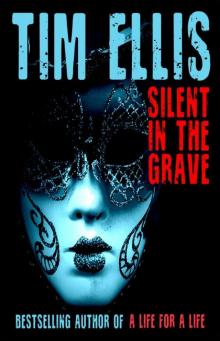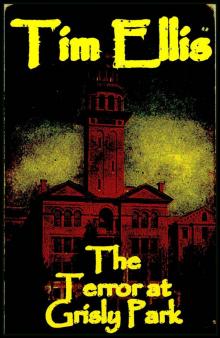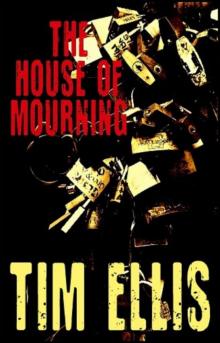- Home
- Ellis, Tim
House of Mourning (9781301227112) Page 5
House of Mourning (9781301227112) Read online
Page 5
‘And you makes five?’
‘Except . . .’
‘Yes?’
‘There’s the manager. He’s got an office of his own off the main office, but he’s my direct boss.’
‘What’s his name?’
‘Terry Mabry, but he’s a fat old man with breathing problems. In a fight to the death I’d probably win.’
‘Okay. Has anything happened at work recently that seemed odd?’
Listening to herself asking questions like a detective, she wondered whether she could get a job in Ray’s team. Maybe, when she reached “Criminal Law” in her studies, she could use this scenario as a case study. Although, with Cookie breaking the law by hacking into people’s private records, probably not. She guessed the Law Society wouldn’t appreciate a case study entitled: “How I broke the law”.
‘I don’t think so. It’s just been business as usual.’
‘And what’s that?’
‘Put simply – meat, game and poultry come in one door, we cut, process and package it into something else, and then ship it out of another door to hotels and food outlets all around the UK.’
‘How many people work there?’
‘About a hundred and fifty.’
‘Nothing unusual about them?’
‘In what way?’
‘I don’t know. Does anybody stand out from the crowd?’
‘There’s Jack Warnock . . .’
‘Oh?’
‘He’s got a six pack that stands out. What I’d like to do to him would probably get me arrested.’
‘You’re not taking this seriously, are you?’
‘I am. I just don’t know what you want me to say. Apart from the two attempts on my life, nothing has happened. I live a boring life.’
‘Okay. We’ll just have to see what Cookie finds out.’
‘What if she doesn’t find out anything?’
‘I don’t know. We’ll cross that bridge when we come to it.’
‘How long do you think I’ll have to stay here?’
‘I suppose as long as it takes.’
‘Only, I have no clothes. I also need to let work know what I’m doing, and . . . I know I don’t have much of a life, but there are people who care about me . . .’
Jerry could empathise with Lorna. Having recently had everything she cared about snatched away from her, she readily understood what she must be going through. ‘Let’s give it until the end of today, and then we’ll decide what to do.’
‘Okay. Thanks again for your help, Jerry.’
‘You’re welcome.’
She could hear Lorna sobbing.
‘Don’t worry. I’m sure Cookie will find some answers.’
The call ended.
What if Cookie couldn’t find out who was trying to kill Lorna? She couldn’t hide in the women’s refuge under false pretences forever. Sooner or later she’d have to go back to her life.
Jerry could only do so much. She had a life of her own as well, and that life at the moment was a stack of law books in front of her. She pulled her dressing gown over her breasts – just in case her dad came in by mistake – and re-read the case law of Carlill v. Carbolic Smoke Ball Co (1893).
***
José María Córdova International Airport
Rio Negro, Columbia
1:52pm
They were sitting at La Casa Café on the concourse waiting for the call to board the plane. It wouldn’t be long now before they were taking off over the Magdalena Valley. The flight would take seven hours and ten minutes with a refuelling stop at Miami International Airport. It was going to be a long journey, but at least they were travelling first class.
He smiled at the idea of Oscar Gamboa ever travelling first class. Only a handful of years ago he’d been running barefoot through Puente de Calamate.
‘What?’ she snapped at him.
‘Nothing.’
‘It can’t be nothing if it made you smile.’
‘I was thinking of my childhood.’
‘Where?’
‘You don’t remember me, do you?’
Her eyes opened wide. ‘You grew up in Puente de Calamate?’
‘Yes.’
‘No, I don’t remember you. Should I?’
‘No. I was a nobody.’
‘You’re still a nobody.’
The corner of his mouth rose slightly, but he didn’t take her bait. He knew he was a nobody in her life. If the plane crashed into the mountains on take-off, would anybody care about him? Would anybody miss him? Mr. Garcia could easily replace him with someone who followed orders just as well. Apart from an elder brother who had a small farm in the Cauca Valley whom he hadn’t seen for seven years, there was no one else. His parents and a younger sister had died a few years ago. Without the los cambios cartel behind him and a gun in his hand he guessed he was still a nobody.
‘Which school did you go to?’ she asked him.
He took a sip of coffee. ‘School was for the other children.’
‘You can’t read or write, can you?’
‘Are you surprised?’
‘Not really. I suppose it explains why I’m here, and who you are.’
‘It doesn’t explain anything.’
‘Then why do you do what you do?’
‘Looking for a hard-luck story for your editor?’
‘I was . . .’
‘What? Feeling sorry for me? You know nothing about my life – let’s keep it that way.’ He finished his coffee and heard their boarding call. ‘Let’s go.’
They made their way to Gate 12, handed over the boarding passes and walked over the connecting bridge to the plane.
The first-class seats were spacious and provided ample leg room. He was pleased there were only two seats in a row After stashing their hand luggage in the overhead compartment they sat down. He let Rosibel take the seat by the window.
Maybe he’d sleep most of the way.
‘What happens when we arrive in the Cayman Islands?’
‘We get to work.’
‘No, I mean . . . sleeping arrangements?’
‘Why? Have you had a change of heart already?’
‘I’d rather sleep with the Mandingas himself.’
He thought he was the “Evil One”. Her heart didn’t seem to be softening towards him. ‘We’ll be sleeping in separate rooms.’
‘You’re not worried that I’ll do something?’
‘Something stupid, you mean? No. And if you’re thinking that with me dead everything will turn out all right – think again. I have a phone call to make at the end of each week. If I fail to make any one of those calls . . .’ He left her to imagine the consequences.
‘Vete al infierno.’
When it was time for Oscar Gamboa to make his final journey, he had no doubt that the Evil One would be keeping a place warm for him.
Take-off went without a hitch, and the plane managed to climb over the Nevado del Ruiz volcano.
Rosibel gripped the arms of her seat until her knuckles were as white as the clouds shrouding the Andes mountain range visible through the window, and he could see her mouthing a prayer:
My holy Angel Guardian, ask the Lord to bless the journey which I undertake, that it may profit the health of my soul and body; that I may reach its end, and that, returning safe and sound, I may find my family in good health. Do thou guard, guide and preserve us. Amen.
Eventually, the seatbelt light went out. The stewardess arrived proffering flutes of champagne, two Ferrero Rocher and a catalogue containing a host of duty free designer items available for purchase.
They both declined.
Once, as a teenager with something to prove, he had drunk himself senseless and spent two days in the local hospital. Since that time he had never touched another drop. In his line of work, losing possession of your faculties was likely to get you killed, and he had a keen sense of survival.
Rosibel stared out of the window.
Adjusting the se
at into a reclining position, he closed his eyes. He wasn’t particularly tired, but without conversation and the ability to read or write there was nothing else to do. Seven hours was a long time to do nothing. There was the radio or a film on the overhead television screen, but he had never taken to either.
He felt a blanket being spread over him and guessed it was the stewardess, but when he briefly opened his eyes he saw that it was Rosibel and didn’t know what to make of that.
Would it be possible to get Mr. Garcia’s money back? Would Rosibel Caballero ever love him? Would his life ever be the same again?
Chapter Five
‘What now?’ Parish said.
They were standing outside 97 Perrysfield Road in Turnford where Fannie Binetti used to live. It was an end-of-terrace two-bedroom house with a public footpath running alongside it on the left.
‘You’re not going to keep asking me what to do, are you?’
‘You’re in charge.’
‘You could use your initiative.’
‘You mean I could be a loose cannon like you?’
‘As your superior officer I think you need to watch your mouth, Detective Parish.’
‘Oh yes, you’re good at lording it over people, but can you lead an investigation?’
‘I can lead an investigation.’
‘Prove it.’
She took Fannie Binetti’s keys out of her jacket pocket and passed them to Parish. ‘Here, you lead the way.’
‘Me?’
‘If there’s someone in that house, you wouldn’t want the senior detective leading this investigation to get it first, would you?’
‘I see, so you’re going to sacrifice your newly qualified partner?’
‘Yes. Leading from the front is overrated.’
Parish took the keys and led the way up the short path to the front door.
Just then, three boys on bikes came hurtling out of the footpath and skidded right down the road.
‘Shouldn’t they be in school at this time of day?’ Richards said.
‘Call the truant officers.’
‘Maybe I will.’
Parish opened the door and stepped inside. ‘Clear,’ he called over his shoulder.
‘Clear! What is that meant to mean?’
‘Clear of armed gang members, booby traps made with hand grenades and cotton, and dirty nuclear devices.’
‘You watch far too much American television for your own good, Detective Parish.’
There was a short hallway to the kitchen and two small rooms off to the left. The first room was a sitting room. There was a flat-screen television, a two-seater leather sofa and another easy chair that didn’t match. It was a cosy room, but would have been crowded with any more than three people in it.
‘They’re tiny houses, aren’t they, Sir?’
‘Are you fed up of leading the investigation?’
‘Oh, I forgot.’
‘What do you want me to do, Detective Richards?’
‘Can I be a Sergeant?’
He laughed. ‘You can be the Chief Constable, if you want.’
‘I’ll look upstairs, you look down here.’
‘What am I looking for?’
‘Anything out of the ordinary.’
Parish adopted a gormless expression. ‘Can you give me examples?’
‘I know what you’re doing, you know.’
‘Do you?’
‘Yes. We’re looking for evidence of current or ex-boyfriends, aren’t we?’
‘If you say so.’
‘I do.’
‘What about the child she’s supposed to have had?’
‘Why?’
‘You tell me why.’
She thought for a handful of seconds. ‘You’re thinking the killer might be the father of the child.’
‘Am I?’
‘You can help me, you know.’
‘Why, don’t you think you can do it on your own?’
‘You’re not on your own when you’re leading an investigation – I help you.’
‘All right, I’ll stop giving you a hard time.’
‘Good. So, you want to be looking for photographs, birth certificates, letters, things like that.’
He smiled. ‘Not bad for a Chief Constable.’
‘And I will be one day.’
‘I’m sure you will.’
Richards banged upstairs.
There was a glass-fronted cabinet with about fifty small white porcelain animals – kittens, dogs, frogs, cats and pigs – on the top shelf. He picked one up and looked at the bottom. It read: Rebecca’s Blueberry Ware. On the second shelf were some ugly Toby and character jugs that were Sandland Ware. Fannie Binetti had obviously been a serious collector of collectibles. He began rifling through the cupboards and drawers beneath the display part of the cabinet and then moved to the shelves in the bookcase. There wasn’t a lot to look at in the room, but anything that he thought might be of interest he placed on the small glass-topped coffee table.
Why wasn’t a thirty-three year old good-looking woman married? Or at least married and divorced? She’d had a baby – how long ago? And where was the child? He looked around the walls, on the cabinet and the bookcase, but there were no photographs of a baby, or the father. There was one picture above the television of an older woman probably in her seventies flanked by two younger women. Fannie Binetti was one of the younger ones. He guessed the other two were her mother and sister.
Richards came in.
‘How are you doing, Detective Parish?’
He grinned. He didn’t know if he liked being a detective again. It had taken him long enough to reach DI. ‘There’s some things on the coffee table I need to look at more closely.’
‘Okay, well I’ve completed my search of the rooms upstairs. She’d nearly finished reading Caribbean Rain by Rick Murcer. How sad is that?’
‘What? Sad that she was reading that particular book?’
‘No, that she’ll never finish it.’
‘Did you find anything else?’
‘She had a pile of designer handbags and shoes.’
Parish’s brow furrowed. ‘Anything that might help us find out who killed her?’
‘No.’
‘No photographs?’
‘She has red satin sheets on her bed.’
‘You go and . . .’
‘Excuse me, Detective. I’ll decide what I’m going to do.’
‘Sorry, Chief Constable.’
‘I’ll go and take a look in the back room and the kitchen.’
‘Good decision, Ma’am.’
‘I could get used to being the Chief Constable.’
‘You’d like to conduct high-powered meetings with politicians, set million-pound budgets, discuss strategy all day, write letters to people apologising for not doing a good enough job, hold disciplinary meetings, sack lots of people, smile until your face hurts . . .’
‘None of that sounds very interesting.’
‘It’s the nature of the beast that everyone gets promoted to their level of incompetence. The more you get promoted the further you move away from the work you were good at to get promoted. Look at Kowalski – he was a brilliant detective, but now he’s a mediocre administrator. He likes being a DCI and he likes the money, but he wishes he was still a detective.’
‘How do you know that he doesn’t like what he’s doing now.’
‘I just know. The same way I know that you’d be the worst Chief Constable in the history of Chief Constables.’
‘That’s not very nice.’
‘Because you’ll be a brilliant detective, and you’d hate not doing what you love just like Kowalski.’
‘Do you really think I’ll be a brilliant detective?’
‘You’re already a brilliant detective. We just need to smooth round the edges and get you qualified.’
‘You can say some more nice things about me, if you want.’
‘I don’t think so. You might get the idea that I
think you’re doing a good job.’
‘You had to spoil it, didn’t you?’ She turned and left.
He sat in the easy chair and picked up one of the two photograph albums. There were a lot of photographs of groups of girls on drunken nights out. There seemed to be a core group of friends and Fannie Binetti liked to party. There were some older photographs of when she and her sister were children, and then as belligerent looking teenagers. There were pictures of her mother and father, a wedding, and holidays with friends in Majorca, Tenerife, and Ibiza. No wonder she had never married, she’d been far too busy having a good time.
In the second album, on the back page, he found a fading Polaroid picture of a newborn baby. The date written at the bottom was: April 12, 1993. Fannie Binetti was thirteen years old when she had her baby.
‘Richards,’ he called.
She appeared in the doorway. ‘You mean, Chief Constable.’
He held out the Polaroid towards her.
She took it from him. ‘The baby?’
‘Yes.’
He could hear the wheels and cogs turning in her brain.
‘She was thirteen.’
‘I know.’
‘And you want to play with million-pound budgets.’
Richards grinned. ‘I’m sure they’d give me a calculator.’
‘I’m sure they would.’
‘The baby was probably put up for adoption.’
‘It seems likely. We’ll know more when we talk to her family and friends.’
She held the picture up to the light from the window. ‘Is it a boy or a girl?’
‘Can’t you tell? I thought women could tell things like that just by looking at them.’
‘I don’t think so. But if that’s true, then I must be defective. Do you think that’s why I can’t get a man?’
‘More than likely.’
‘You’re just teasing me.’
‘Did you find anything in the other room?’
‘No. It’s more like an ironing room, and the kitchen is just a kitchen.’
‘We may as well go then.’
‘Lunch?’
Parish licked his lips. ‘Most definitely. And with the money you’re making as Chief Constable, you can pay.’
‘Ha, ha! Very funny.’
***
‘How do you think it’s going, Sarge?’ Stick asked once they were sitting down in the cafeteria at King George Hospital with their meals. He’d chosen a baked potato with a chilli con carne topping and crinkle cut fries from the Baked Potato Bar, while Xena had the moo shu chicken in lettuce cup.

 In the Twinkling of an Eye (9781311593672)
In the Twinkling of an Eye (9781311593672) Silent in the Grave (9781311028495)
Silent in the Grave (9781311028495) The Terror at Grisly Park (Quigg 5)
The Terror at Grisly Park (Quigg 5) Jacob's Ladder (Stone & Randall 1)
Jacob's Ladder (Stone & Randall 1) Dead Know Not (9781476316253)
Dead Know Not (9781476316253) The Gordian Knot (Stone & Randall 2)
The Gordian Knot (Stone & Randall 2) Be Not Afraid (9781301650996)
Be Not Afraid (9781301650996) Shadow of Death (9781476057248)
Shadow of Death (9781476057248) Through a Glass Darkly (9781301753000)
Through a Glass Darkly (9781301753000) Breath of Life (9781476278742)
Breath of Life (9781476278742) House of Mourning (9781301227112)
House of Mourning (9781301227112) Lost Children of Bethnal Green (Quigg #9)
Lost Children of Bethnal Green (Quigg #9) Lamb to the Slaughter (9781301399864)
Lamb to the Slaughter (9781301399864)